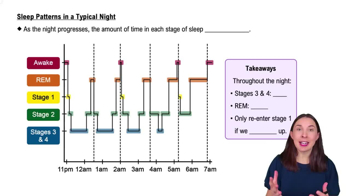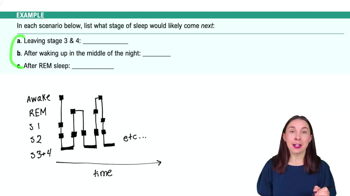Table of contents
- 1. Introduction to Psychology1h 43m
- 2. Psychology Research2h 20m
- 3. Biological Psychology2h 41m
- 4. Sensation and Perception28m
- 5. Consciousness and Sleep32m
- 6. Learning41m
- 7. Memory34m
- 8. Cognition37m
- 9. Emotion and Motivation35m
- 10. Developmental Psychology33m
- 11. Personality48m
- 12. Social Psychology41m
- 13. Stress and Health41m
- 14. Psychological Disorders44m
- 15. Treatment47m
5. Consciousness and Sleep
Sleep
Struggling with Psychology?
Join thousands of students who trust us to help them ace their exams!Watch the first videoMultiple Choice
Natural cycles of activity that bodies must go through are called
A
states of consciousness.
B
hypnotic states.
C
biological rhythms.
D
microsleeps.
 Verified step by step guidance
Verified step by step guidance1
Begin by understanding the concept of 'biological rhythms'. These are natural cycles that regulate various physiological processes in the body, such as the sleep-wake cycle, hormonal release, and body temperature.
Consider the term 'states of consciousness', which refers to the different levels of awareness of one's thoughts and environment, such as being awake, asleep, or in a hypnotic state.
Examine 'hypnotic states', which are altered states of consciousness characterized by increased suggestibility and focus, often induced by a hypnotist.
Understand 'microsleeps', which are brief episodes of sleep that occur when a person is awake, often lasting only a few seconds, and typically happen when someone is sleep-deprived.
Identify that 'biological rhythms' are the correct answer because they specifically refer to the natural cycles of activity that bodies must go through, unlike the other options which describe different states or phenomena related to consciousness and sleep.

 3:25m
3:25mWatch next
Master Circadian Rhythms with a bite sized video explanation from Hannah Gordils
Start learningRelated Videos
Related Practice


































































































![Race, Genes and IQ Differences | Bret Weinstein [Mini Clip]](https://img.youtube.com/vi/IztL_m3pd70/mqdefault.jpg)



































































































